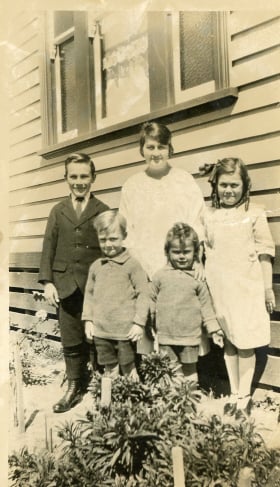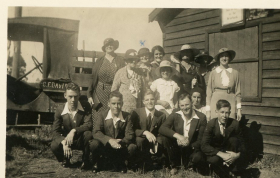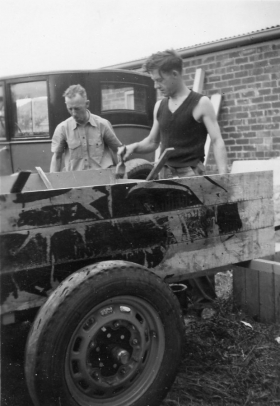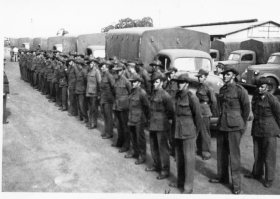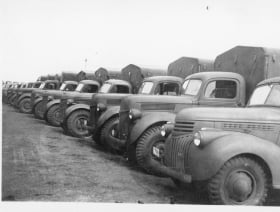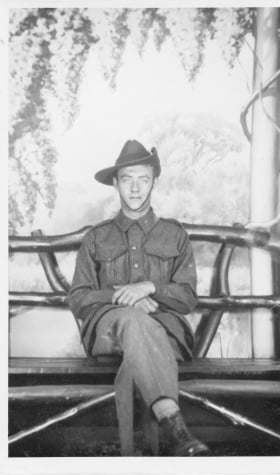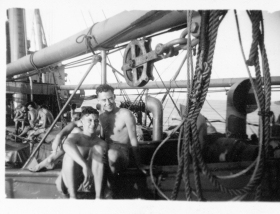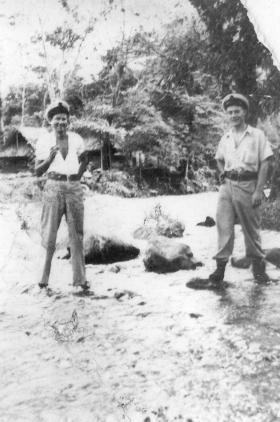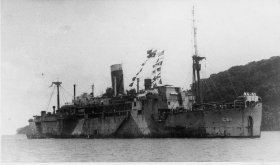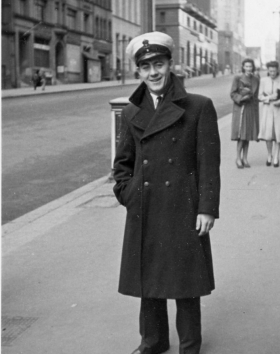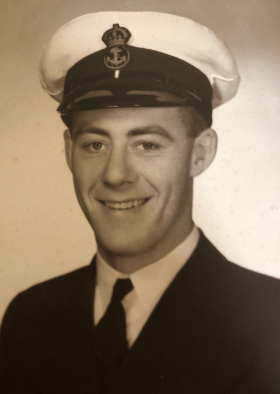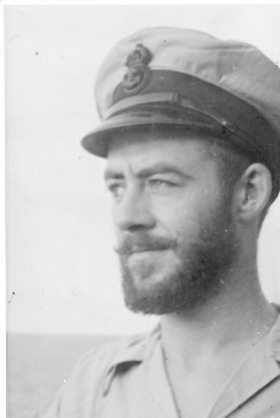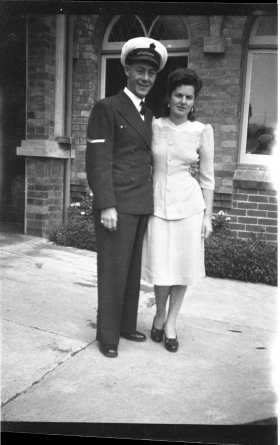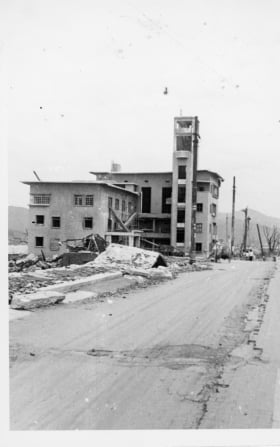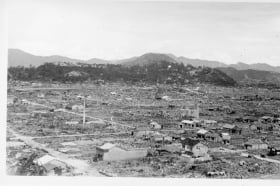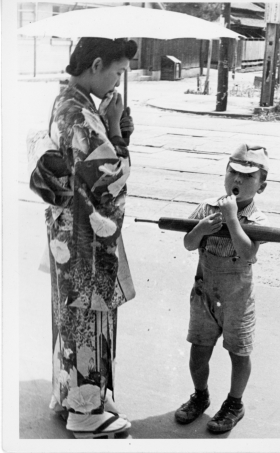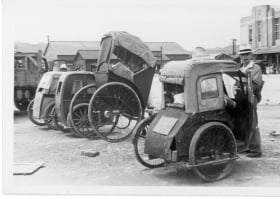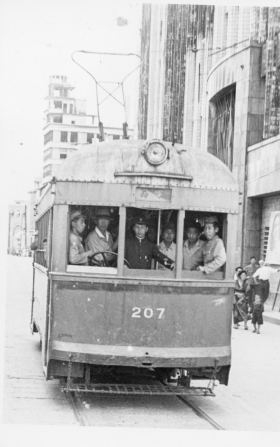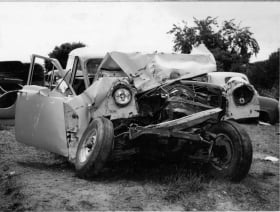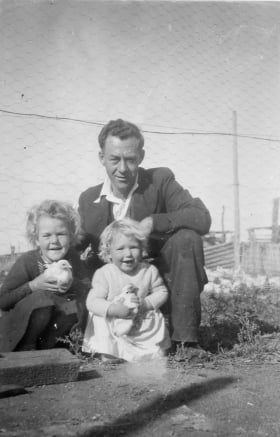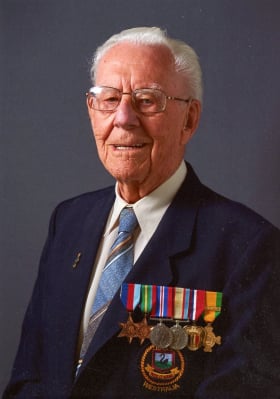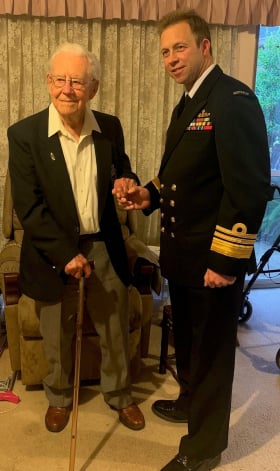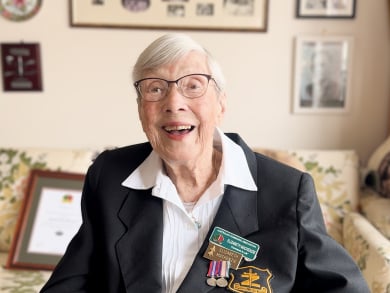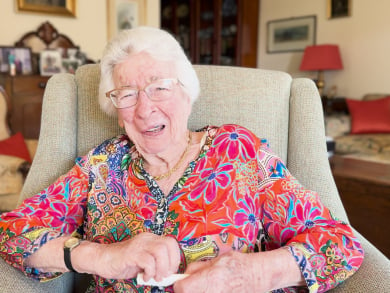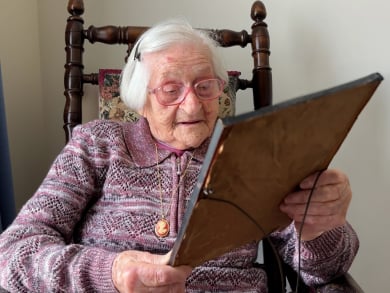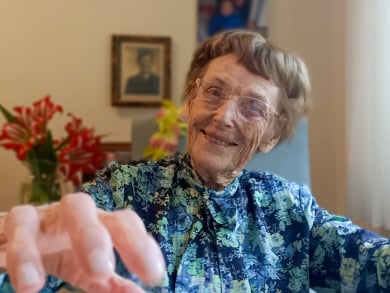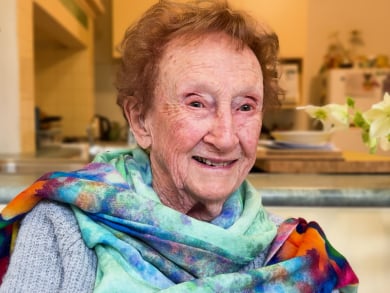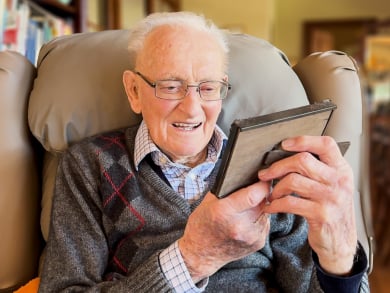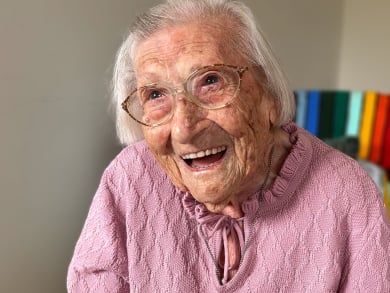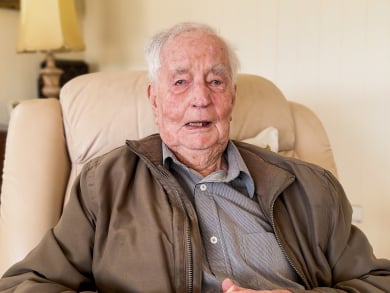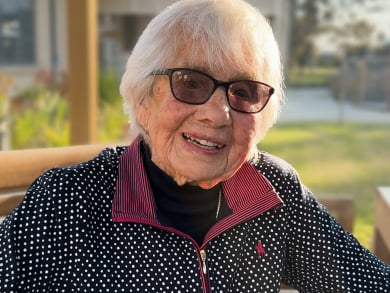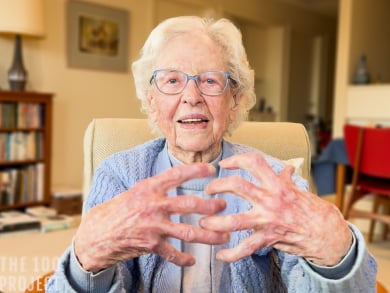Dad was born in Australia.
Mum was born
in Nottingham in England.
She was just like any ordinary mother,
I suppose.
So she came out to Australia
and that's when she met my father.
Two brothers and two sisters.
But they're all dead.
I'm the last one of the family.
Well, there was no other kids around
where we lived.
There were the tile works.
There used to be a big clay hole
where they used to get the clay for the tiles.
My Dad, he worked at the tile works.
He used to fire the kilns.
Make glazed tiles.
I left school the day I was 14
because I wasn't very keen on school much.
And I got a job in Flinders Lane
in a warehouse. Manchester.
They used to sell sheets and
Summer Breeze cotton dress material.
And that was just a little bit up
the hill from
from Swanston Street.
Cable trains...
just jump on a tram
anywhere on the road, on
the track, because the cable cars
were fairly slow.
When the war broke out,
I was just at the right age
and I was conscripted
and they sent me up to Seymour
and I used to drive a truck from
Seymour railhead
to Puckapunyal, the army camp.
I didn't like the army, I didn't like
the camp life, it was so primitive.
They'd give you a bundle of
straw to sleep on and the cooks
didn't know how to cook.
The food was crook.
Toilets were a 'no-no',
just sit on a rail with a big hole.
Thank goodness
it only lasted for three months.
The war lasted
longer than they thought it was going to.
They were starting to pick out
certain people,
a certain number, to go into the,
be permanent in the army
and I didn't like the army.
I did everything I could to get out of it.
So I decided I'd go
and get a 'reserved occupation'.
I got a job in the aircraft
factory in the store.
That was a reserved occupation then.
We didn't have to join the army.
They used to make Wirraways.
It never went ahead,
they weren't a match for the Zeros.
And I was working on shifts.
When I was on night shift
I'd see everybody going to dances
and things like that.
Well, that
used to upset me a bit when I couldn't go.
One of the boys was dead set on
joining the Navy.
One day he said "I'm going to join
up so are you coming?", and
I said, "No, I'm not going to join up".
Well anyway
"Just come up while I go and sign up".
Three of us went up there.
When we went in,
there was nobody in the office
and when the fellow came and saw us there.
"Oh" he said "three new recruits".
I said, "No, only one recruit.
We're only just onlookers".
"Oh...
all right", he says so he put his hand
under the desk and pulled out a paper.
He said, "Here's a form for you,
one for you, you and you".
Three of us.
"So fill them
in" he says "and I'll fix the rest up".
The three of us went to Cerberus
down at Flinders.
I put my name down to be a cook.
I had such a bad goings in Seymour
that I decided at least I'm
going to get where the food is.
I hadn't been on it long then they called
for 'officers' cooks'.
So I volunteered for that.
They sent me to the
Kanimbla.
All we were doing is ferrying troops
from one place to another.
Getting itchy feet
we wanted a bit of action.
Wanted to see some real action.
Well, then the war started properly.
General MacArthur made a speech and said
he was going to come back,
back to the Philippines.
I said
to the people of the Philippines
whence I came,
I shall return.
And he was going to
get the Philippines back
and going to use us
to help get it back,
which turned out to be true.
They transferred me to the
Westralia.
That's where I stayed
for the rest of the War.
It had been refitted out
for landings.
I did seven landings on Westralia.
We used to carry the troops up there,
the American soldiers.
We carried a thousand,
over a thousand troops,
and the troops used to sleep in the hold
with all their machinery - Jeeps and things.
They had a big net.
The soldiers climbed
down the net over the side
and they climbed down
in and got into the little boats
and they ferried them to shore
'til all the troops had been taken off.
And all the trucks
and things, ammunition;
what they needed to carry on the war.
That took all day.
They were firing at us
and we were firing at them.
And so it was pretty scary
the first few times
but after a while, we got used to it.
So they sent us
up to Leyte, up to Manila.
There was an action there that day.
Landing operations in the Philippines.
Striking first at Leyte Island
have now been undertaken by the largest
ocean-going amphibious force in history,
led by Admiral Halsey.
But after it was over
we went back and got more troops,
reinforcements, and then
we went up
and did the last one in the Philippines,
and that was, the
very top, Lingayen Gulf.
I was right
under the bridge.
This is why I'm a little
deaf these days
because there was a 4 inch gun
just above me there.
Right there
and I'm looking out the window
at the front.
Looking out over the bow.
Half a dozen planes flying around
and our blokes were chasing them.
They were chasing our blokes
and anyway there was one left,
they were all shot down.
He was picking out the ships
that he was going to bomb.
And so I knew
that we were going to be one of them
because we had troops,
we had a thousand troops on board
and all their equipment,
trucks and ammunition, food, everything.
So I could see
what was going to happen there,
and it did happen.
They took on us
and the plane,
the Japanese plane wanted to stop us
from landing the troops.
I'm up in the galley,
looking out, watching it all happen.
And I was scared.
I thought, well, this
could be the last.
I saw the bomb dropped out of the plane.
It didn't hit the ship,
but it was that close,
only a few feet,
and it hit the water and it lifted
the back of the ship up, the stern,
lifted it up and out of the water.
And it damaged the rudder.
And the plane hit the water.
He was...
that was his last ride.
But it was nearly ours too.
When we got to Lingayen Gulf,
you arrived there in the dead of night,
line up in the dark.
As soon as the dawn's
starting to
break,
that's when all hell breaks loose.
The planes were chasing one
another around the sky, our planes off
an aircraft carrier that they had there,
and then the Japanese...
wanted to land at Manilla Airport.
We nearly got
hit a couple of times there.
...firing, they were firing back
and one Japanese aircraft
snuck in over the trees.
Radar doesn't pick it up
when it comes so close to the trees
and that's how they missed it
and dropped the bomb on the Australia.
Knocked the funnel off the Australia
and an American battleship
and it blew a great big hole
in the side of the ship
That day, General MacArthur,
he was on one of the warships
and I saw him walk ashore
with two of his generals
and a couple of fellas
and he
made his speech about how he
promised he'd be back and now he was back.
People of the Philippines,
I have returned.
Once the Japs capitulated,
they sent us, and loaded the ship up
with troops
and things for occupation.
Japan.
So they sent us up there to Japan.
That was the last trip I ever
made on the ship.
And I walked all over the site
where they dropped that bomb.
You could see where the bomb dropped.
I went and had a look all over it.
And there was just nothing.
Just a lot of rubble.
The happiest day...
the happiest moment
was when I walked out of the Navy.
And I didn't have to...
yes, yes, yeah...
you know what I mean.
